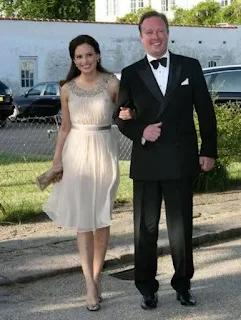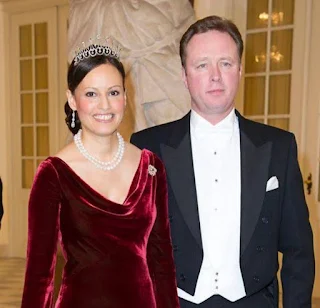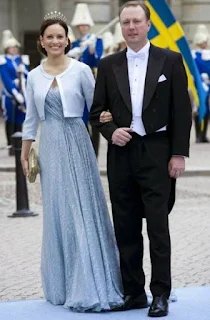The relationship of Prince Gustav, the 7th Prince of Sayn-Wettgenstein-Berleburg, and nephew of Queen Margrethe II of Denmark, and his longtime partner, Carina Axelsson, is one fascinating story to tell.
Their royal love story is not the first to emerge in papers about a prince falling in love with a woman not born of royal or aristocratic blood. And could not marry due to certain conditions stipulated in his inheritance.
But certainly, their romance of unequal birth (morganatic) is the first to survive in the 21st century, patiently waiting to be solemnized in marriage.
This is a story of a modern fairytale. An enduring love between a prince and a woman outside the aristocracy barred from marrying all because of the circumstances of their birth. But continue to hold on to each other to be together.
This type of love story in European royalty is no longer surprising. In fact, most European princes and princesses, even Kings, in the current times have married commoners. But why Prince Gustav cannot do so, just like his royal cousins?
His case is different because his inheritance is tied to an old "will", prohibiting him to marry a non-aristocratic woman who is not a protestant.
Perhaps, you have so many questions to ask about this unique love story, so we have to address all the confusions and will try to answer each.
Who is Prince Gustav?
Prince Gustav, 53, is the 7th Prince and current head of Sayn-Wittgenstein-Berleburg, a German princely house in Bad, Berleburg, West Germany. Although German royalty had been abolished in 1918 following Germany's defeat in World War I, German royals and their descendants continue to use their royal titles and designations (although not legally, but just a sort of courtesy title).
Unlike other abolished monarchies in the world, German royals' properties including castles and palaces were not sequestered by the government. It remained in their possessions.
Prince Gustav's mother is Her Royal Highness Princess Benedikte of Denmark, 11th in line of succession to the Danish throne, and the younger sister of Queen Margrethe II of Denmark. His father was Prince Richard, the 6th Prince of Sayn-Wittgenstein-Berleburg, who died in 2017.
He directly descended from Queen Victoria of the United Kingdom through her third son, Prince Arthur, Duke of Connaught and Strathearn. He is a second cousin of Crown Princess Victoria of Sweden.
He has two younger sisters, Princess Alexandra and Princess Natalie. He was born on January 12, 1969, in Frankfurt, Germany. As the only son of Prince Richard, he was his only legitimate heir. The principality and estates of Sayn-Wittgenstein-Berleburg in Germany can only be inherited by male descendants.
While still no son, his heir-presumptive is his father's younger brother, Prince Robin. And at 53, it is doubted if Carina can still conceive.
So to keep the family title and estates within their line, Prince Gustav needed to have legitimate male heirs. In August 2000, he was engaged to the granddaughter of a French ambassador, Elvire Paste de Rochefort, but a year later, the engagement was called off and they eventually broke up (reason of their breakup at the bottom of this article).
A year after calling off his engagement, in 2002 (not 2006 as other articles online would claim it) he would meet the love of his life. At a dinner party in Germany (Prince Gustav in later years admitted in an interview that their meeting had been set up by their friends), he was introduced to Carina Lyn Axelsson.
Who is Carina Axelsson?
Carina was born on August 5, 1968, in California, USA, to a Swedish father and a Mexican mother. She grew up in Santa Cruz, San Francisco, California. When she was 20, she moved to Paris, France, and began working on her books. She speaks English, Spanish and French, and a little Danish.
For a time, she moved to Dorset, England, where she became a keen gardener, and raised several dogs. Following her relationship with Prince Gustav, she moved back to Germany and lived with him at Berleburg, Germany.
She is a book author of Young Adult fiction, and a book illustrator for children's books. Her first book publication was in 2014, Model Uncover, a YA series through Usborne Publishing.
The relationship
Their relationship was exposed when they both attended the wedding of his first cousin, Prince Donatus of Hesse (the one who attended the funeral of Prince Philip, Duke of Edinburgh in 2021) to Countess Floria Franziska Marie-Luisa Erika von Faber-Castell in 2003. The bride is his third cousin through Princess Dagmar of Denmark.
Prince Gustav introduced Carina to his family and Gustav to her family. The Danish royal family, and his extended royal cousins, including the Swedish and the Greek royals, accepted her into their folds.
Carina admitted she likes Denmark. In an interview with Bille Bladet, a Danish magazine, she said, "Paris and London are okay but I love Copenhagen. It is beautiful with a lot of culture and delightful restaurants".
She wanted to publish a cookbook because she likes cooking. According to Prince Gustav, in the same interview with Bille Bladet magazine, "Carina is a good cook", noting that they both love Italian dishes.
In 2005, Carina moved to Berleburg Castle to live with Prince Gustav, they occupied a wing in the castle previously occupied by Princess Margareta, the grandmother of Prince Gustav who died in 2005. In 2008, Prince Gustav organized an elaborate party for Carina's 40th birthday.
In the 2008 interview with Bille Bladet, Carina commented about their relationship, "Princess or Mrs. Axelsson does not matter for me. Our situation is special, all of my family understand and accept it. Gustav's parents have been fantastic to me. I felt great warmth from all in the royal family. The Queen (Margrethe II) and Prince Henrik (who died in 2018) have been extremely sweet and generous. Eventually, we shall be rightfully become, man and wife".
Asking about having children, Prince Gustav answered, "It is in God's hands".
Despite not yet a legal wife of Prince Gustav, Carina has enjoyed the perks of being a princess, including wearing family heirlooms and tiaras loaned to her by Princess Benedikte. She has been accepted into Prince Gustav's family and circle of friends, as his partner, attending royal events and important milestones like the 70th birthday of Queen Margrethe II and her Ruby jubilee on the Danish throne.
In royal events, including the state wedding of Crown Princess Victoria of Sweden in 2010, she was seen wearing the Sayn-Wittgenstein-Berleburg family heirloom, the Diamond Spike Tiara. She also wore the Queen Ingrid's tiara, a royal heirloom of the Danish royal family which believed to have only worn by a legitimate royal family member.
Why they did not marry?
They officially began their relationship in 2003 and have not broke up. Carina has been accepted by Prince Gustav's family as his partner. So people wondered why they did not get married.
The main reason is due to a clause in his grandfather's will, preventing him from inheriting the family estates and properties should he marry a non-aristocratic woman who is not a protestant.
There's a provision in German inheritance law that's a bit strange. If the properties and estates are bequeathed to grandchildren (skipping one generation), it will reduced inheritance tax.
So Prince Gustav's grandfather, Prince Gustav Albrecht, 5th Prince of Sayn-Wettgenstein-Berleburg, bequeathed the principality's estates and other properties directly to his grandson, while his title to his first born son, Prince Richard (father of Prince Gustav).
The 5th Prince (1907-1944) of course was born in a time royal marriages were confined within the aristocracy circle, so he stipulated in his will that Prince Gustav can only inherit all those properties if he will marry a noblewoman and a protestant.
The 5th Prince died two decades before Prince Gustav was born. But for years, he could not legally claim his inheritance due to the legal dispute raised by other male relatives to the German court.
Relatives contested the inheritance will and asked the German court to settle who will be the right heir. Only in June 2020 that the dispute settled and declared Prince Gustav the rightful heir.
This paved the way for his plan to marry his longtime partner. Although, this decision raised more concerns, as those relatives might still challenge him in court due to the clause in his grandfather's will about marriage. And it has a legal basis.
Marriage finally!
Just yesterday, April 27, 2022, the Danish royal court officially confirmed that Prince Gustav and Carina Axelsson will finally wed on June 4, 2022.
Many royal watchers were surprised by the sudden decision of Prince Gustav to wed his longtime partner, which for nearly two decades, hesitated to do so due to the clause on his grandfather's will.
So what made him change his mind? And what would be the consequences?
The Danish royal court refused to address issues surrounding the circumstances of Prince Gustav's decision, however, some royal analysts weighed on the situation:
- Prince Gustav inherited his title and the headship of Sayn-Wittgenstein-Berleburg from his father, so it cannot be challenged, it's his for life. He is the rightful heir.
- His grandfather's will covers only the inheritance and properties and not the princely title.
- In June 2020, the German court declared Prince Gustav as the unconditional heir of his grandfather's will and not his great-uncle, Prince Ludwig Ferdinand. However, this remains to be seen comes June as Prince Robin can still challenge him on the grounds of disobeying his grandfather's will regarding marriage.
- There's a weird situation among German princely houses. Usually, the heads bequeathed their properties to their grandsons, skipping one generation, to reduce inheritance tax.
- Since his princely title and the headship of the principality are not covered by his grandfather's will, it cannot be taken from him, thus, he remains the 7th Prince despite marrying a commoner, and Carina, after the wedding, will assume the title Princess Carina of Sayn-Wittgenstein-Berleburg.
- However, at stake are the properties and estates he inherited, which might be challenged in court by his heir-presumptive, and other male relatives.
- Expect a possible court drama after the wedding.
- Prince Gustav's chances of overturning the marriage requirements in his grandfather's will in the German court are very slim. There were similar cases in the past where German princes tried to overturn what was stipulated in the will but were defeated.


















0 Comments